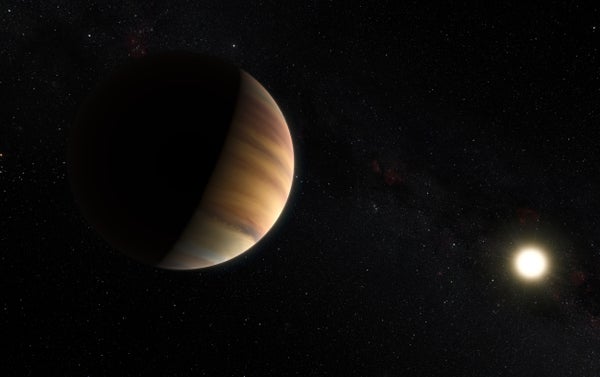The sincerest expression of love is to learn the characteristics of the object of our affection as they are, without reservations or prejudice. By this definition, the pursuit of scientific knowledge is the ultimate act of loving nature in its full splendor. Scientific inquiry can only enhance the awe we feel when witnessing reality in all of its quantitative detail.
The beauty of nature comes for free. The fact that all phenomena in the physical world obey a small set of strict laws is remarkable, given how difficult it is to enforce societal laws in the human world. I often imagine how disorganized the universe could have been if it resembled my daughters’ rooms each morning.
We tend to feel hubris when we contemplate cutting-edge technological accomplishments, such as self-driving cars. But in fact, a more balanced perspective requires humility, not hubris. Following a recent injury, my body healed from its bruises faster than it took my optometrist to get me a new pair of glasses. Our most advanced technologies are yet to produce a self-healing car that repairs itself after accidents like the human body.
On supporting science journalism
If you're enjoying this article, consider supporting our award-winning journalism by subscribing. By purchasing a subscription you are helping to ensure the future of impactful stories about the discoveries and ideas shaping our world today.
Nature is not just beautiful; it exceeds the limits of our imagination. Relatively recent examples in astronomy include the unexpected discoveries of dark matter and dark energy whose nature are still mysterious; the ubiquity of “hot Jupiters” that hug their suns in tight orbits, in contrast to the Jupiter in our own planetary system; or the strange properties of `Oumuamua, the first interstellar object discovered in the solar system. This experience is generic to all research fields, making science a learning experience in which we expand our ability to imagine simply by observing reality.
The scientific process is a dialogue with nature where we propose theoretical ideas and listen to nature’s response through our experiments, rather than a monologue in which we focus on mathematical beauty and simply assume its relevance to reality. Figuring out the subtleties of nature is more challenging than proving theorems in mathematics, because the latter activity involves only the human. But there is only one physical reality out there, out of an infinite number of possibilities that could have existed. The outcome of our scientific inquiry is not up to us: reality is predetermined by nature.
While pursuing research, we could miss important discoveries if we expect the future course of science to resemble its past history. When you are not ready to find exceptional things, you will never discover them. The 1995 discovery of the first “hot Jupiter,” 51 Pergasi b, by Michel Mayor and Didier Queloz, for which they won the 2019 Nobel Prize in Physics, confirmed a theoretical proposal by Otto Struve from 1952. The four-decade delay was caused by the refusal of the mainstream to allocate telescope time for a hot Jupiter search based on the argument that it would violate what we “know” about the solar system. A similar sort of delay predated the 1992 discovery of the first Kuiper belt object in the outer solar system by David Jewitt and Jane Luu.
These examples illustrate how scientists rely on conventional wisdom to decide what’s true rather than having the humility to subject their assumptions to experimental tests. Before Galileo Galilei, it was the conventional wisdom that heavy objects fall faster than light objects under the influence of gravity. But he dared to conduct an experimental test that proved this notion wrong, and established the “equivalence principle,” which in turn became a foundation for Albert Einstein’s theory of general relativity. In reaction to his contesting another false prejudice—that the sun orbits the Earth—Galileo was kept in house arrest for nine years until his death in 1642. But this did not make the sun revolve around the Earth nine times; it only delayed the natural progression of scientific knowledge.
Reluctance to test new ideas based on the conviction that they are “unreasonable” is not the only repeating pattern since the days of Galileo. There is also the tendency, after data are taken, to ignore anomalies—to downplay the unexplained and declare “business as usual” even in the face of contradicting evidence. Giant arcs of light around the cores of clusters of galaxies appeared in images that were published in the Astrophysical Journal, but were ignored until the topic of gravitational lensing became fashionable in the 1980s. In this case, Fritz Zwicky predicted such arcs in 1937, more than four decades earlier.
Scientists are not immune to wishful thinking, and a reality check on their convictions is mandatory. This is a particularly important lesson to keep in mind when considering the risk from in-person events before an experimentally tested vaccine for COVID-19 is widely available. Scientific rigor should not be compromised, especially in life-and-death situations.
In a recent exchange with a philosopher who suggested that there is “no loss” inherent in our natural death because we do not own our future, I responded that from the perspective of astronomy, death involves losing the ability to follow the universe as it evolves. The experience of death therefore feels like being in a concert hall, with the usher escorting you out while the orchestra is still playing the symphony. It is a fundamentally lesser experience to listen just to a part of the symphony, whose full meaning and beauty is apparent from the whole. Cutting our stay short represents a loss. He conceded.
The human being as a spectator of nature appears on occasion comical, at other times tragic, but most of the time insignificant relative to everything else taking place out there. Humanity’s lack of imagination should be forgiven as a temporary handicap that scientists are attempting to repair. Education takes time even when the students love the class.
